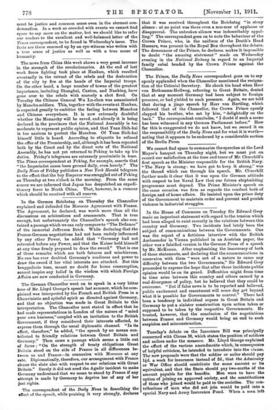The news from China this week shows a very great
increase in the strength of the revolutionaries. At the end of last week fierce fighting took place at Hankan, which resulted eventually in the retreat of the rebels and the destruction of the city by fire at the hands of the Imperial troops. On the other hand, a large number of towns of the greatest importance, including Shanghai, Canton, and Nanking, have gone over to the rebels with scarcely a shot fired. On Tuesday the Chinese General Wu Ln-chen was assassinated by Manchu soldiers. This, together with the events at Hankau, is expected greatly to embitter the feeling between Manchus and Chinese everywhere. It is now extremely doubtful whether the Monarchy will be saved, and already it is being declared in the provinces that the National Assembly is too moderate to represent public opinion, and that Yuan Shih-kai is too anxious to protect the Manchus. Of Yuan Shib-kai himself little is heard. According to etiquette he refused the offer of the Premiership, and, although it has been repeated both by the Court and by the direct vote of the National Assembly, he has not yet returned to Peking to take up his duties. Friday's telegrams are extremely pessimistic in tone. The Times correspondent at Peking, for example, asserts that " the Imperialist cause loses ground daily, even hourly." The Daily News of Friday publishes a New York Herald telegram to the effect that the boy Emperor was smuggled out of Peking on Thursday at two o'clock in the morning. From the same source we are informed that Japan has despatched an expedi- tionary force to North China. That, however, is a rumour which should be received with all reserve.


















































 Previous page
Previous page